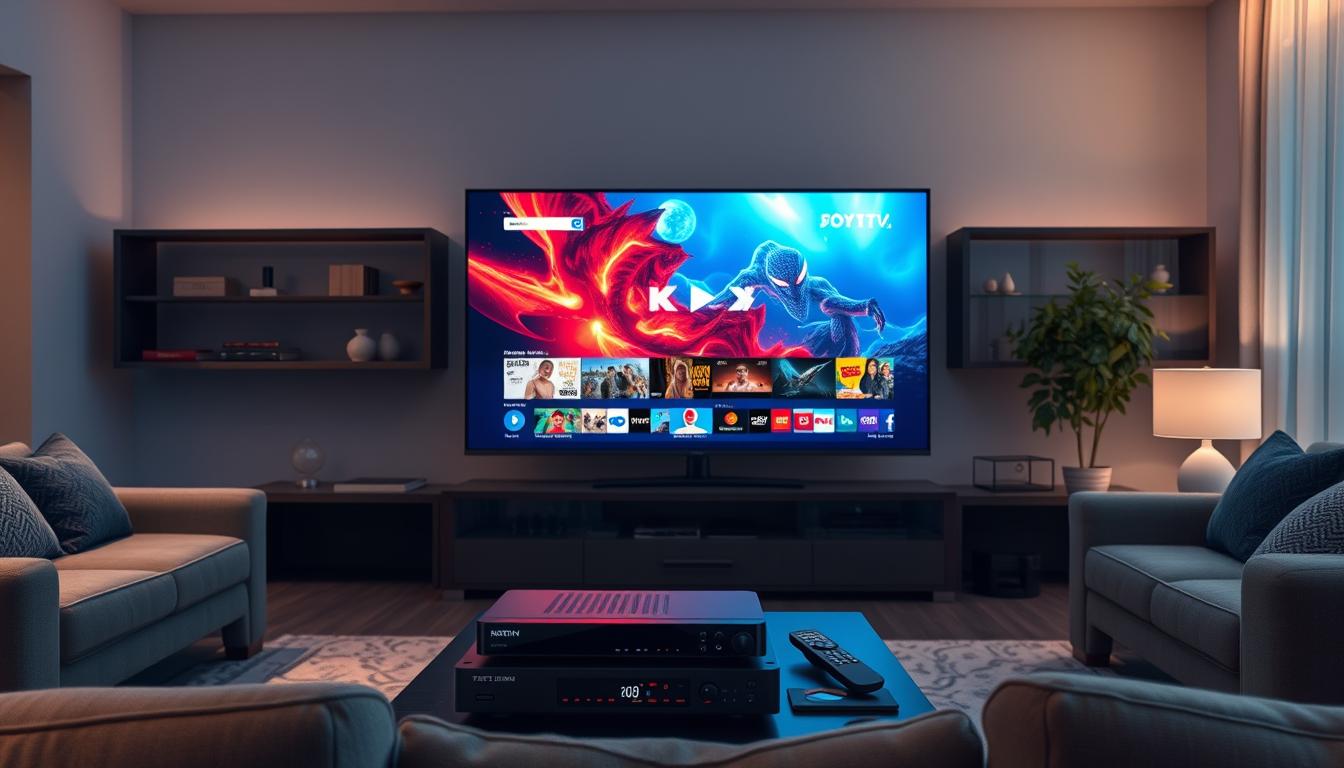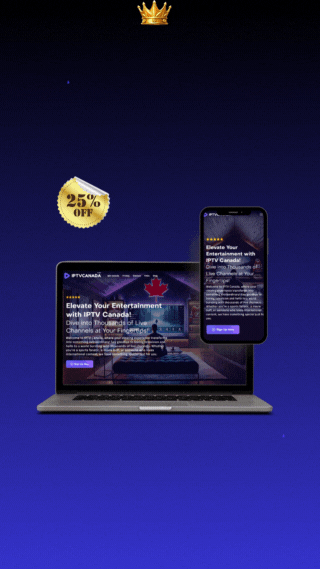
IPTV Meaning: What Does IPTV Stand For?
IPTV, or Internet Protocol Television, is changing how Canadians watch TV. It uses the internet to send TV shows and movies. This makes watching TV more flexible and personal than old cable or satellite TV.
Key Takeaways
- IPTV, or Internet Protocol Television, is a technology that delivers television content over the internet.
- IPTV offers a more personalized and flexible viewing experience compared to traditional cable or satellite TV.
- IPTV is gaining popularity in Canada as an alternative to traditional TV services.
- IPTV technology uses internet connectivity and streaming protocols to deliver content to viewers.
- The future of IPTV is closely tied to the rise of smart TVs and evolving consumer viewing habits.
Understanding IPTV: A Comprehensive Guide
Television is changing fast, thanks to a new technology called IPTV, or Internet Protocol Television. It’s becoming popular in Canada because it offers more flexibility and a wider range of content than traditional cable TV.
The Rise of Internet Protocol Television
IPTV is getting more popular every year. This is because more people have fast internet and want to watch what they want, when they want. Unlike cable TV, which uses cables, IPTV uses the internet. This makes watching TV smoother and more connected.
IPTV vs. Traditional Cable TV: Key Differences
The main difference between IPTV and cable TV is how they deliver content. IPTV streams content over the internet, while cable TV uses cables. This means IPTV has some big advantages:
- Flexibility: IPTV lets you watch on many devices, like smart TVs and phones. This makes watching TV more personal.
- Personalization: IPTV has cool features like recommendations and profiles. You can also pause, rewind, and record live TV. It really caters to what you like.
- Expanded Content: IPTV offers more IPTV channels and on-demand content. This includes special and international shows that cable TV might not have.
More and more Canadians are choosing IPTV over traditional cable TV. They like the new features and variety it offers.
What Does IPTV Stand For?
IPTV stands for Internet Protocol Television. It’s a new way to watch TV over the internet. This method lets viewers choose what they watch, unlike traditional TV.
IPTV uses the Internet Protocol (IP) to send and receive TV signals. It lets users watch live channels, on-demand shows, and get personalized recommendations. This makes TV watching more flexible and fun, on devices like smart TVs and phones.
The IPTV definition covers all the services and tools needed for this new TV way. It uses the internet to give viewers a more personal and interactive TV experience. This meets the changing needs and habits of today’s TV watchers.
Knowing what IPTV is can help you understand the changing world of home entertainment. As TV technology keeps improving, learning about IPTV is key to seeing what’s new and exciting.
“IPTV represents a fundamental shift in the way we consume and interact with television content, empowering viewers to take control of their viewing experiences.”
| IPTV Definition | Key Characteristics |
|---|---|
| Internet Protocol Television (IPTV) is a technology that enables the delivery of television content over the internet, offering a more interactive and personalized viewing experience. |
|
How IPTV Works: Decoding the Technology
IPTV (Internet Protocol Television) uses internet and advanced streaming to bring you great shows. It combines internet and streaming tech for a top-notch viewing experience.
The Role of Internet Connectivity
IPTV needs a strong internet connection to work well. It uses the internet instead of old TV lines. So, your internet quality affects how well IPTV works.
Streaming Protocols and Delivery Methods
IPTV uses special protocols and methods for a smooth watch. These include:
- Real-Time Streaming Protocol (RTSP): This lets you pause, rewind, and fast-forward.
- User Datagram Protocol (UDP): It sends video and audio fast, cutting down on delays.
- HTTP Live Streaming (HLS): Apple’s HLS adjusts video quality based on your internet, for a better watch.
These protocols and methods help IPTV providers offer top-notch service. They meet the needs of today’s viewers.
| Streaming Protocol | Description |
|---|---|
| Real-Time Streaming Protocol (RTSP) | Allows for control and delivery of streaming media with features like pause, rewind, and fast-forward. |
| User Datagram Protocol (UDP) | A lightweight and efficient protocol used to transmit video and audio data in real-time, minimizing delays and buffering. |
| HTTP Live Streaming (HLS) | Adapts the video bitrate to the user’s internet connection, ensuring a seamless viewing experience. |
Knowing how IPTV uses the internet and special protocols shows its advanced tech. It’s changing how we watch TV and enjoy entertainment.
Benefits of IPTV Streaming Services
In the world of TV, IPTV streaming services have changed the game for Canadians. They bring many benefits that are winning over viewers across the country.
One big iptv benefit is how flexible they are. Users can find a huge range of shows and movies easily. They can watch what they like, when they like, without being tied to TV schedules.
IPTV streaming services also give you content that’s just right for you. They use smart tech to suggest shows based on what you like. This makes watching TV more fun and helps you find new shows you’ll love.
Another great thing about IPTV is the wide range of channels and shows. Canadians can enjoy everything from local news to international shows. This lets viewers see the world in a new way and enjoy more entertainment.
“IPTV has revolutionized the way Canadians experience television, offering unparalleled flexibility, personalization, and content diversity.”
As more Canadians use iptv streaming services, TV is getting even better. IPTV’s advanced features and easy use with new tech are changing how we watch our favorite shows.
Exploring IPTV Providers and Channels
The Canadian IPTV market is booming, with many providers and channels available. This growth meets the demand for on-demand and live streaming content. Understanding IPTV providers and their channels is key for Canadians wanting better home entertainment.
Popular IPTV Providers in Canada
Top IPTV providers in Canada include Bell Fibe TV, Rogers Ignite TV, and Shaw BlueSky TV. They offer a wide range of IPTV channels. This includes popular local and international content, plus on-demand shows.
For those looking for more choices, independent providers like Starchoice, Totalplay, and Beanfield Metroconnect are popular. They provide customized packages and a wide range of niche channels. This meets the varied tastes of viewers.
Canadians can find a vast selection of IPTV channels with IPTV. These include news, sports, entertainment, and educational content. They also offer on-demand movies, TV shows, and live events. IPTV’s flexibility and convenience make it a favorite among Canadian families.
IPTV vs. Cable TV: The Pros and Cons
In Canada, people can choose between IPTV (Internet Protocol Television) and traditional cable TV. Each has its own benefits. Your choice depends on what you like and need. Let’s look at the good and bad sides of IPTV and cable TV to help you decide.
Cost Comparison: IPTV vs. Cable TV
IPTV is often cheaper than cable TV. It has a lower monthly fee. This is because IPTV uses the internet, saving on cable costs. You can also pick only the channels you want, making it even more affordable.
Cable TV, however, has more channels. It includes lots of local and international options. While it costs more upfront, it offers a wide range of content.
| Feature | IPTV | Cable TV |
|---|---|---|
| Cost | Generally lower monthly subscription fees | Typically higher monthly subscription fees |
| Channel Selection | Offers a la carte pricing, allowing users to select only the desired channels | Provides a more comprehensive channel lineup, including a wide range of local and international channels |
| Flexibility | Highly flexible, with the ability to access content on multiple devices | Relatively less flexible, as content is primarily accessed through a set-top box or cable connection |
“The choice between IPTV and cable TV ultimately comes down to personal preferences and budgetary considerations. Both options have their unique advantages, and the best choice will depend on your viewing habits and the features you value most.”
In summary, IPTV is cheaper, while cable TV has more channels. Your choice depends on your needs, preferences, and what’s available in your area.
Setting Up Your IPTV Experience
Setting up your IPTV (Internet Protocol television) is easy. But, there are a few steps to follow. This guide will help you choose an IPTV provider, get the right equipment, and connect it to your TV or devices.
First, find an IPTV provider that fits your needs. Look for providers with lots of channels, on-demand content, and reliable IPTV technology. Think about price, customer reviews, and if they’re available in your area.
After picking your IPTV provider, get the needed equipment. This usually means a set-top box or a smart TV with IPTV. Some providers offer a package with both the device and service.
- Connect the IPTV set-top box or smart TV to your home internet with an Ethernet cable or Wi-Fi.
- Turn on the device and follow the instructions to set up your IPTV service.
- If your provider has a mobile app, download it on your phone or tablet for on-the-go access.
Now that your IPTV is set up, enjoy a wide range of television programming, movies, and on-demand content. Explore different channels, find new shows, and use IPTV’s cool features like pause, rewind, and time-shifting.
“IPTV technology has revolutionized the way we consume television, offering a more personalized and on-demand viewing experience.”
Whether you’re cutting the cord to save money or want a tech-savvy viewing experience, setting up IPTV is simple. It opens up a world of entertainment options for you.
The Future of IPTV: Trends and Innovations
Television is changing fast, and IPTV is leading the way. Canadians love the ease and variety of IPTV streaming services. The mix of IPTV with smart TV tech is making watching TV better than ever.
IPTV and the Rise of Smart TVs
Smart TVs have changed how we watch TV. They combine IPTV with internet features. This lets users enjoy lots of streaming services and on-demand shows from home.
These smart TVs come with cool features like voice control and personalized shows. They make it simple to switch between live TV, on-demand, and streaming services. This mix of tech has made watching TV more fun and easy to find what you want.
| Feature | Benefit |
|---|---|
| Voice Control | Hands-free navigation and content search |
| Personalized Recommendations | Tailored content suggestions based on viewing habits |
| Seamless Switching | Effortless transition between live TV, on-demand, and streaming |
As tech keeps getting better, IPTV will get even more connected with smart TVs. Canadians will enjoy a top-notch viewing experience that meets their changing tastes.
Conclusion
IPTV is changing how Canadians watch TV. It’s important to know what IPTV is and what it offers. This way, you can decide if it’s right for you.
The IPTV market is growing fast, with a 15.1% CAGR from 2023 to 2032. It lets viewers watch TV on many devices over the internet. This changes how we watch TV, making it more flexible.
Content providers like IPTV for its efficiency in reaching many viewers. It offers a wide range of content, improving the viewing experience. Despite some challenges, IPTV’s benefits are clear.
As IPTV grows, Canadians will enjoy a better TV experience. It’s changing how we watch TV, making it more personal and exciting.






